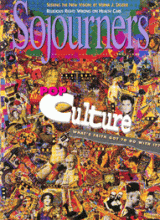Summer campfires and sing-alongs aside, the history of God's people is written twice: Once in documents beginning with the Torah and the Bible, and simultaneously in the music passed from family to clan to tribe to city-state to nation, through war, commerce, slavery, and emigration, and between successive generations.
The folk tradition maintains an astonishing integrity. For example, the classic nursery trio "eeny meeny miny moe" is thought to have originated in pre-Christian Scotland as a counting technique used by shepherds. Two thousand years later, these words are the engine of many counting-out rhymes in places far-flung as Melbourne, Saskatoon, Chicago, and Bombay.
In this country much of our church music tradition is European, but the pot still simmers with international ways to praise. The Appalachian harmonies of shape-note singing, preserved nearly intact since the early 1800s, gave us tent standards like "Amazing Grace" and "Wondrous Love." African-American gospel gems like "Wade in the Water," and "Didn't It Rain?" raise rafters as well as the spirit. Soulful spirituals like "Steal Away" and "Jacob's Ladder" reveal the plaintive side of African roots meeting Christianity. A group of women in Milwaukee sing a new set of verses to the tune of "Jacob's Ladder," beginning "We are weaving Sarah's circle...." This is the beauty of the folk traditionevolution within a structure.
The faith-sharing tradition of Latinos in the Southwest adds songs like "Demos Gracias," "De Colores," and "Un Espiga Dorado por el Sol" to the body. Just for fun, church camp and teen revival standards like "Give Me Oil for My Lamp" and "Jesus Save the Popcorn" testify to the lighter side of Christian folk music.
Read the Full Article
